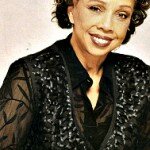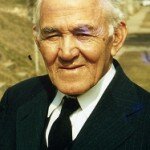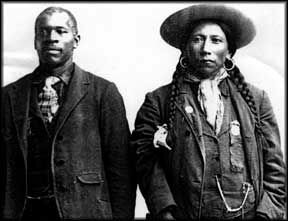Native Americans are part of African American history
Talk About Race — By Guest Author on February 18, 2010 at 12:13By Luay Broadnax
If you’re white and say you have Native American blood, then that’s alright. It’s looked on in some places as a badge of honor. But if you’re black, you’re accused of not wanting to own your African lineage.
I have lived more than 70 years as an African American and I have been proud of everything that this means. As a fashion model, I was a black model. I was a radio personality on black radio. I am a member of the National Coalition of 100 Black Women. I grew up in the Bronx as an African American. I went to an historically black college, Hampton University.
But as a child, I knew I had psychic powers. I knew about events such as death and illnesses before they happened. My mother, who was African American, ignored it to a point; but when people began to pick my brain for information relating to their life, including the number for the day, my mother then started to become more protective of my psychic ability.
My father’s aunts and uncles, who were Native American understood and told me it was part of my heritage from their side. They also told me that my gift with food came from them. In the old days, Native Americans could find medicinal plants in new locations because of a keen sense of smell. I have a keener than normal sense of smell. If I can smell a food dish, I can make the same original dish without its recipe.
When I am cooking with herbs, fresh vegetables, and fruits, I play African music but my dance is the one my Native American grandmother taught me.
During my research for a book I am writing about my life, I discovered a long history of how Native Americans and African Americans mixed. African slavery actually replaced Native American slavery over a period that lasted a half century or more starting in the late 1600s.
American history books cover this period in just a few sentences. It is actually one of the most fascinating aspects of our history. This melding of the two groups was easy because there were so many ways that the spiritual nature of Indians and the spiritual nature of Africans coincided.
Both believed that the Earth is our Mother. “Mother Africa” –you never hear an African say “Fatherland,” as the Germans did, and do. “This Earth, our Mother” is the translation of an Indian chant. Both groups were often organized into matrifocal clans.
They both believed that humans are punished for violating mother earth. They believe in the regenerative powers of the mother and that the earth gives forth every kind of medicine that a human needs. Many of the designs, myths and folk tales that we call African are the products of both groups.
Native Americans and African Americans hunted, fished, farmed, and trapped together and were traded as slaves together, not just in the plantation South but also in the Caribbean, and the Southwestern United States. For example, there were Indian reservations in Virginia not far from Hampton University, where I started college.
In the old days it was called Hampton Institute, and it was actually created in 1878 to educate both blacks and American Indians. The Indians came to campus from the tribal reservations in the area. Many of the Indians in the area married blacks. Originally the name “colored people” included both Native Americans and African Americans, and all mixtures thereof.
One tribe near Hampton was the Chickahominy (”The Coarse Ground Corn People”). Hominy grits (the full name for grits) became a staple of black folk because of mixing with Native Americans.
I have a great recipe for okra, shrimp, and grits from the restaurant, Ida Mae’s, which I used to own in midtown New York. Originally black folk brought the okra plants from Africa and the mixture of okra and grits became a dish that united the two traditions. It makes a delicious dish when mixed with sand shrimp that were plentiful in the waters out east of Hampton.
In my youth, my doctor in Harlem was the famous black woman doctor, May Chinn. Her mother was a mixture of Chickahominy and African American. Dr Chinn used African and Native American remedies; but she had to hide that fact because the drug companies were establishing their monopolies. They’d drive any doctor out of business who still used what were called “folk remedies.”
Dr, Chinn became one of the nation’s first great cancer detection specialists. She said she could go into a home and smell if someone there had even the earliest stages of cancer. Our Native American heritage is fascinating. I think as African Americans we try to cram a broad, rich history into a narrow space.
Tags: African American, African-Americans, american indian, american indians, History, Talking about RaceAuthor: Guest Author (106 Articles)




 Share This
Share This Tweet This
Tweet This Digg This
Digg This Save to delicious
Save to delicious Stumble it
Stumble it





10 Comments
Does the author expect us to take her seriously when says “But as a child, I knew I had psychic powers.” Additionally she says:
“This melding of the two groups was easy because there were so many ways that the spiritual nature of Indians and the spiritual nature of Africans coincided.
Both believed that the Earth is our Mother. “Mother Africa” –you never hear an African say “Fatherland,” as the Germans did, and do. “This Earth, our Mother” is the translation of an Indian chant. Both groups were often organized into matrifocal clans.”
As most of us know, Africa is a large continent with a number of recognized people groups and cultures. To be credible, the author needs to be more precise and objective instead of using broad sweeping characterizations.
GMC
I hear what you’re saying about “psychic powers” and the broad characterizations. I though the same too. But I have to be honest. After I got past that point. I was very interested in learning more about the relationship between African Americans and Native Americans.
I am interested in the story of escaped or freed slaves going a living on reservations. I’m now interested in learning more about the facts.
There is a documentary I want to see called “Black Indians: An American Story” have you seen it?
A friend of mine on Facebook also mentioned: “IndiVisible: African-Native American Lives in the Americas,” at the National Museum of the American Indian, in DC.
You make a good point Jamaal and while the author needs to allow for more diverse worldviews within Africa in order to be accurate, I certainly need to credit her for taking on this topic. Many of us from the south can attest to some native-American ancestry, though in my case, the details of their lives and how the two groups came came together to create one family is pretty murky. I haven’t seen the “Black Indians” documentary, though I think I’ve heard about it.I’ll try to see if I can access it. I’m in the DC area so I also need to get down to the National Museum of the Native American-I haven’t been since shortly after it opened.
According to Fender, tomorrow is the 40th anniversary of of Jimi Hendrix’ first gig. From Wikipedia:
“Carlos Santana has suggested that Hendrix’s music may have been influenced by his partly Native American heritage.”
http://en.wikipedia.org/wiki/Jimi_Hendrix
I appreciate you taking this topic on. I am interestred when I hear that Black or Skin folk don’t have an affinity for eachother, not enough to write an article or to do research, but intersted enough to feel that its too bad or a shame that individuals from these two cultures don’t feel family… but then again, you can’t choose yr family- it just is, right? My family has ALWAYS made it clear that we are voth Native and Black. I claim it to the extent that I am sure nit to disclaim my Native American ascestry- it’ smine too. However, I have been raised and have lived culturally Black. I know that waaaay down the line there is some scotch Irish/Chev/ and whatnot,I am mostly Black and Black Culturally&Heritage wise if that makes sense. I am conscience of not trying to fabricate that I was raised on the Rez, or was kept up with the POW WOW or any other outward, to others, proof of my Native ancestry. I guess I feel like when I hear other mixed race/can hardly tell, Natives wave their banner of Indianship I kinda feel like they want to take some kind of credit or honor for something they didn’t do, haven’t lived or struggled through, and truly don’t know anything about the inside part, the life (not that all Natives have had the same life) and just want credit in some way= the badge without the battle, if you will. Yea, you have the blood (most of us do!) but do you have the right? I take ownership that this is my issue, and so I write it from the heart. No saying that it is true of anyone else’s thought process but my own. I feel the same when a lilly white, straight haired, blonde, says shes black- But did you live it? If not, think about how high you are waiving yr banner as a certain culture- not we don’t all live the same because we are of one culture, but we have similar exerpiences due to how we are received by the world depending on how we look and how we have lived. I’m angry for Indians/Natives/Skins/Bloods when someone who is obviously 99% white claims Native and reeps any of the positive outward, monitary, or educational benefits as a result, I feel like its their white ancestry that afforded them an opportunity to create a paper trail where their features didn’t pull it off. You are what you live, you are what you eat. So I say, but who am I? Beautiful, light brown Black Blackfoot Cherokee Cuba and some people stealing enslaver blood no doubt. How was I brought up? With love and povery and good tasting cheap food and canned or frozen veggi’s, rough and very tough, a loner and part of and fam, on my bike and moved around a lot, a dancer and singer and lover of music, and books, and comradery- too many pictures on the walls, and making do with whacha got-this is what I have in common with the Indians and Black folks I love and feel, and the other colors too. I dnt need to claim Indian or disclaim Indian to feel what I have felt, or live how I have lived. Ya feel me? I am Black with plenty of Native, I was brought up Black, I look Black to mee because thats what i feel- I look yellow to others. AND what makes the author think that her psychic powers only came from the Natives? Thats what makes Black folks question yr not claiming yr Black. How you know it didn’t come from yr African side? Just wondering. I feel a special spiritual connection to Native Americans,and folks with Native blood too. But lets discuss how you can to it being the Native in you as opposed to the African in them? or perhaps the Blackfoot? I think I’ve picked up on that more often
Interesting read that triggers this question, how does the author know that she got her “psychic powers” from her Native American heritage? “My father’s aunts and uncles, who were Native American understood and told me it was part of my heritage from their side.”
It’s very possible she was gifted with that ability through her African ancestry. I’m just saying, why does that ability have to be Native? I’m Native and certainly can smell a good dish cooking, but I also rely on Safeway for quality vegetables when it comes to cooking up a nice meal. I’m also an intuitive person, because that is how I was taught, anyone, red, black, white, or yellow has that capability.
I recommend that the author conduct more research on the relations between the African slaves and Native Americans with a more critical eye and one that is not so romantic. The relations were not as romantic as she portrays them to be and it is true, American history books do mention these relations, HOWEVER keep in mind WHO wrote about these relations. The majority of American history is written by Euro white males who did not have a Native or Black experience, let alone an experience filled with cultural knowledge. Basically, there are many gaps that are unfilled and left to the unknown reader to fill in on their own, which is where romanticism evolves.
I’m certain the author has a life time of memories filled with great folklore, family history, and cultural knowledge that could be written into a book, but finding archived resources to balance out a romanticized view of Native and African slave relations can also be a helpful addition to what sounds like a beautiful story.
These threaded conversations, esp on the subject of race inside communities of color, never fails to amaze. As an academic and multiracial person, I cld say much, but i seem to be a little late to this converse. First, my work “Taking Away the Medicine” appears in the exhibition catalog mentioned above at the NMAI/Smithsonian in DC mentioned above-” Indivisible: African-Native American Lives in the Americas” thru May 1. Go see it. Last, a sense of belonging is important to everyone, but romanticizing identity in the face of structural inequalities for POCs is cultural hyprocrisy–the highest youth suicide rate in the world exists in the Native Amer. rez community in the US and maternal mortality rates among AfAm women is higher than it should be. But remember-these literary ventures of the genealogical imagination, fact or fiction, sell books and that’s what this is about. At then end of the day–Mitayuke Oyasin (We are all related)!